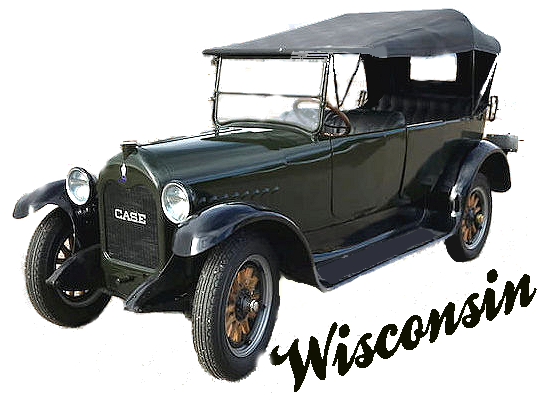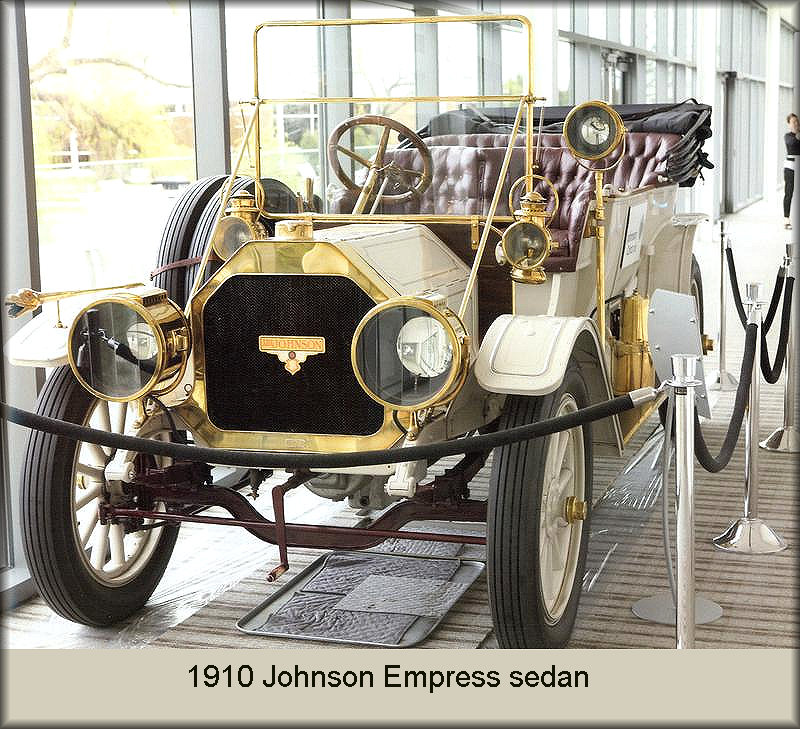


Mobile users:
For best results, view in Landscape mode.
Johnson Service Company
( Johnson Controls )
Milwaukee, Wi
1885 - present
The Johnson Controls name is one of the
most iconic brands in Milwaukee today.
Their products, high-tech batteries and
temperature regulators like thermostats,
are leaders in their industries.
In 1883, Warren S. Johnson first invented
and received a patent for the electric
room thermostat.
In 1885, Johnson Electric Service
Company was formed.
In 1901, Johnson’s drive for innovation lead
to patents for an “auto-carriage” steam
generator and a forerunner of power steering.
Over the next 11 years, Johnson Electric
Service Company produced 1,000 steam-
powered cars, fire trucks, limousines
and ambulances.
The company was among the first to
receive a contract to deliver mail
with a horseless carriage.
In 1902, the company's name was
changed to Johnson Service Company.

The original Johnson was a 4-cylinder steamer
with an enormous hood and ornate enclosed
body.
The steam engine was a single-acting type
of 30 hp.
In 1907, Johnson Service Company
introduced a line of gasoline cars featuring
luxurious leather and wood interiors.
After 1907, Johnson adopted internal
combustion engines of three sizes,
up to 50 hp.
The Company stopped automobile manufacturing
after 7 years when its president died.
As did most steam car manufacturers,
Johnson made the transition to gasoline
cars around 1908 - 1909.
By 1909, Johnson had begun marketing
HVAC systems for public buildings.
Among other things, the firm produced a
series of postcards to promote this
business.
Between 1885 - 1911, Johnson researched
into many other areas, including electric
storage batteries, steam and gas powered
automobiles, huge pneumatic tower clocks
and wireless telegraph communication.
After it's president's death in 1911, the
company decided to focus solely on its
temperature control business for
nonresidential buildings.
In 1974, the company was renamed to
Johnson Controls.
In 1978, Johnson Controls merged with
Globe-Union, a Wisconsin-based
manufacturer of automotive batteries for
both the replacement and original
equipment markets.
7 years later, it bought seatmakers
Hoover Universal and Ferro Manufacturing.
In the early 1990's, Johnson Controls expanded
its presence within cars and light trucks in
the early by offering interior components
such as headliners and door trim.
In 1996, the company strengthened its
position as a worldwide leader in interior
systems through the acquisition of
Prince Automotive.
Prince is known for its innovation, from the
first lighted vanity mirror in 1972 to the
integration of electronics into interior
systems.
In 2011, Johnson Controls announced the
acquisition of Hammerstein Group and Keiper,
experts in seating metal structures, components
and mechanisms, and the performance
vehicle seating specialist RECARO Automotive
Seating.
In 2015, Johnson Controls and Yanfeng
Automotive Trim Systems Co., Ltd. form the
Yanfeng Automotive Interiors joint venture,
the world’s largest supplier of automotive
interiors parts.
The automotive business accounted for
roughly two-thirds of Johnson Controls’ sales
before its merger with Tyco International
in 2016.
In 2016, Johnson Controls started to exit
the automotive industry to return to its old
roots of focusing on climate control systems
for buildings.
In 2016, Johnson Controls spun off its
automotive seating business, now known
as Adient shortly after the Tyco merger.
Adient’s businesses include Johnson Controls’
former automotive interiors business, which
now is part of a joint venture with Yanfeng
Automotive Trim Systems.
As of 2016, Johnson Controls provided
all aspects of a complete interior, including
overhead systems, floor consoles,
door systems, instrument panels and
seat systems.
Johnson Controls Automotive Experience was
a global leader in automotive seating
components and systems.
They supported all major automakers in the
differentiation of the vehicles through their
products, technologies and advanced
manufacturing capabilities.
As of 2018, Johnson Controls Power Solutions
was the world's largest manufacturer of
automotive batteries, approximately 152 million
a year to automakers and aftermarket retailers.
In 2018, the Clarios company, based in Glendale,
was created by Johnson Controls International's
sale of its automotive battery business
for $13.2 billion.
The Milwaukee area is the headquarters
of the company with $8 billion in revenue
and 16,000 employees worldwide.
The business was bought by Brookfield
Business Partners L.P., a publicly traded
limited partnership, and a group of institutional
investors, including Caisse de dépôt et
placement du Québec, which manages
public pension plans in Quebec, Canada.
Clarios is now the largest manufacturer of
automotive batteries in the world, producing
roughly one out of every three batteries,
or about 154 million a year, worldwide.
The company also is a leading global
recycler of conventional batteries.
Up to 99% of the materials in its batteries
can be recovered and reused in the new
batteries it makes, according to the company.
Clarios has signed a long-term lease with
Johnson Controls for its headquarters in
Glendale.
The building also is the Johnson Controls’
headquarters and its employees will
remain in the building.
The two companies will share the cafeteria
and fitness center, but their operations will
be in separate and secured parts of
the building.
The sale completed Johnson Controls’ exit
from the automotive business and created a
'pure-play' company focused on heating,
cooling, fire protection, and security products
and services.
There's only about a dozen of the
Johnson Controls vehicles left in existence,
including 2 owned by the company.
